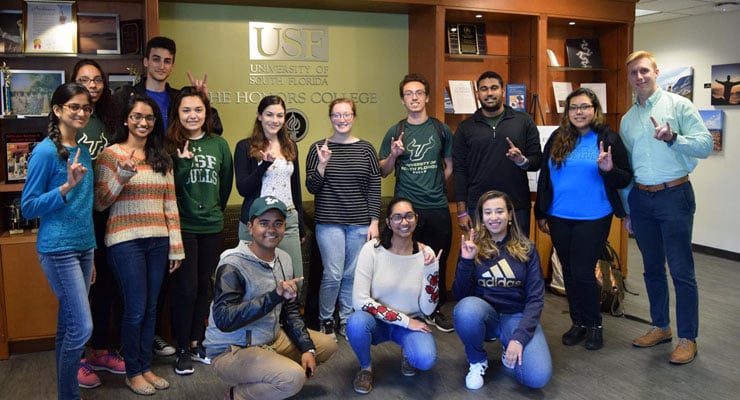Winter Break Tips for High School Seniors Preparing for College
By Joe Emerson | Last Updated: Mar 5, 2025

Winter break is perfectly timed for college-bound high school seniors who need a respite from classes, some time with family and friends, and relief from the college hunt jitters. ’Tis that season, so here’s a gift that can ease those jitters and help seniors maximize holiday cheer: winter break tips for high school seniors preparing for college.
Stay on Top of High School Studies
Getting the most out of senior year isn’t solely about grades, but ensuring that those final grades don’t slide is a wise use of a few hours of winter break. Sure, it virtually puts you back in the classroom, but it also can ease those college hunt jitters.
A weak senior year finish is a red flag for admissions officers. If you already have an acceptance letter from your dream college, take another look at the wording. You likely have been granted conditional admission that can be rescinded if the final high school transcript is problematic. Your best bet is to stay sharp and on top of your game.
Schedule Campus Visits
The arrivals of acceptance letters intensify a need for information best gathered during campus visits. Getting in-person looks at campuses and facetime with students and staff are the best ways to fully inform your decisions.
You’ll need that information before making your final pick. National College Decision Day is May 1, but timelines vary by school and application type:
- Regular decision: Typically apply from Jan. 1 to Feb. 1 for the fall semester and get an answer in March or April, with a decision deadline for you of May 1.
- Early action and early decision: Typically apply by mid-November for the fall semester and get an answer in December. Early decision usually means you are committed if accepted. Early action typically has a decision deadline for you of May 1.
- Rolling admissions: Typically opens in the fall and continues into the spring for a fall semester start. Expect an answer in four to six weeks. The typical decision deadline for you is May 1.
Unless you applied early decision, have been accepted, and are locked in, or already have visited every school you can, you should be planning visits, so you can be fully informed when making your final choice.
A tour during winter break is doable but isn’t ideal because most campuses will be in holiday mode: no classes, few students present, most staff on break. Here are some tools for those who need to put campus visits on their calendars:
- “Take a Campus Tour from Home”
- “How to Prepare for a Campus Tour”
- “Questions to Ask on a Campus Tour”
Polish Your Volunteerism Portfolio
Helping others is a worthy goal; it doesn’t hurt when helping others helps the volunteer. The best approach here is to add to volunteer efforts you have pursued over time. Show admissions officers what you are passionate about through your volunteer choices. If it’s your first taste of volunteerism, logging a couple hours at a food pantry just in time to get it on an application isn’t going to have a positive effect on an admissions officer.

Read a Good Book
Reading skills got you where you are and can propel you through college and life. What should you read? There are more must-reads for the college-bound than you can shake a bookmark at, and most colleges have lists of their own. See whether your college picks have reading lists, or find some recommendations online. This way, you can continue to broaden your worldview and prepare yourself for the college academic experience.
Begin Working on Skills You’ll Need in College
Do you know how to do laundry? How are your housecleaning skills? Can you cook? Maybe some microwave magic? Can you handle a grocery cart? Can you craft a budget? These are skills you will need throughout life, and there’s no upside to learning them on the fly when you start college.
Hone your budgeting skills by calculating college expenses and crunching numbers for financial aid and scholarships. If you’re unsure about where to start, ask your family for help. As for domestic skills, start volunteering now to do chores. You’ll get useful training and make someone happy.
Identify and Tie Up Loose Ends
Winter break is a great time to revisit your college applications checklist. It’s one of the best ways to calm the college hunt jitters, and you might head off a problem.
- Do you have applications that were due by Jan. 15, Feb. 1, or later that need a final run-through? If the clock has ticked past the deadlines, is it time to verify the applications were received?
- Are all your essays written and polished?
- Are all the letters of recommendation you need either in the process of being written, en route, or received?
- Did you have any early decision or early acceptance applications? Follow through. Be sure to respond to any important communications and submit all necessary paperwork.
- Do you know the three types of deadlines for the Free Application for Federal Student Aid (FAFSA). They are the school’s, your state’s, and the federal government’s. Are you on track with all of them?
- Have you done what’s necessary to avoid FAFSA mistakes?
- Have you done your homework on FAFSA and financial aid?
- Have you completed the College Scholarship Service profile and explored scholarship options at your target schools?
- Have you tried scholarship tools such as My College Options’ Scholarship Search?
- Have you schooled yourself on the scholarship hunt process? Check out these articles:
While there is a lot to do to prepare for college, staying organized will help you succeed. Give these winter break tips a try, and you might find yourself ahead of the college curve.
The USF Office of Admissions always is ready with advice and answers. Contact us online, or reach us by phone at 813-974-3350.



